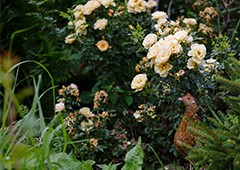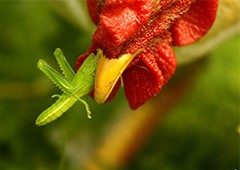Tea in synonymous with the backyard lifestyle. Whether you're sitting on the deck, watching the laying hens forage, sipping on a nice warm cup of English breakfast with honey, or if you’re showering your veggie patch with manure tea concentrate – WAIT! Hang on? Manure tea? Manure tea may not sound as appetising as your standard “white and two sugars, please”, but the benefits it has for your crops and plants are simply astounding. Brewing up a nice big bucket of manure tea may not seem like the most appealing way to spend your weekend however once you see the benefits you may find yourself compulsively stockpiling this precious formula. Find out how to make this nutrient dense powerhouse garden booster by reading this easy how to guide.
Eww! Manure tea?! Do I want to know?
Yes, admittedly “manure tea” doesn’t leave a pleasant picture in your head, but you could always consider renaming it “garden tea” or “gardener’s brew” – whatever makes you feel most comfortable. Nevertheless, manure tea is basically a liquid concentrate enriched by the poultry manure (or any other backyard omnivore manure) which has remarkable effects on your garden. Manure is traditionally quite high in nitrogen, which is the main element that promotes plant growth, but it is also a rich source of other vital garden ingredients. In essence, using manure tea on your garden is an easy way to give your crops and garden an encouraging pat on the back and kick in the pants.
Wait – how’s this different from compost tea?!
Compost tea is the same basic thing in theory and method, except for the fact you use healthy compost instead of pure manure. So, when reading the recipe and method below, it’s always possible to interchange "chicken manure" with "compost".
What do I need to make my manure tea?
Any Chicken Lady will have no trouble getting their hands on the basic ingredients for manure (or compost) tea. For anyone else who doesn't keep chickens or any other animals, getting your hands on some manure isn't necessarily as easy as it sounds. Keeping chickens goes hand in hand with growing a bountiful and beautiful garden, which you can read about here. Chickens are a great source of pungent, nutrient dense manure and they also help eradicate bugs and weeds. If you're a long time garden lover but chickens are a bit new you you, make sure you read this eggcellent beginners guide here.
Now, here is what you need for your chicken manure tea or “gardener’s brew” for those of you with more delicate constitutions…
Ingredient and tools:
-
2.5 kilograms of chicken manure (or compost).
-
24 litres of water.
-
Old pillowcase or some other kind of makeshift strainer.
-
Gloves.
-
Shovel or spade.
-
Face mask for the squeamish.
-
A very large bucket.
Basically work on the ratio of approximately 1 part manure to 10 parts water. It is likely you’ll need to increase or decrease your batch size depending on the storage equipment you have on hand.
Ok! I’m ready! What do I do next?
Now that you’ve got your manure (or compost) tea tools and ingredients at the ready, it’s time to make yourself a nice big pot of this good stuff. Here’s what you need to do…
-
Put on gloves and a face mask and prepare your large bucket. Make sure you concoct the brew in a spot, away from children and animals, who might knock the bucket over or try and drink from it. Also, it’s not a good idea to move the manure tea bucket around too much, given the fact that it might splash all over you – not pleasant.
-
Dump the manure into a large old pillow case or something similar and fasten it shut – elastic bands or a bull clip with suffice.
-
Place the manure filled pillow case into the bucket.
-
Fill the bucket with water – ideally this should be around 24 litres to every 2.5 kilograms of manure, but this isn’t an exact science, so don’t be afraid to fill the bucket right up if you have the extra space.
-
Leave the mixture to steep for 2 to 3 days.
-
Stir the mixture approximately twice a day. This helps oxygen travel through the mixture, which is ultimately beneficial for the brew.
-
After 2 to 3 days remove to pillowcase and dump the remaining sludgy manure into the compost.
Voila! You now have in your possession a potent garden boosting potion! But remember, with great power comes great responsibility.
How do I wield my powerful manure tea concentrate?
Now, there are a couple of key principles that any green thumb needs to abide by when it comes to manure tea. The sense of power can be overwhelming and it might be difficult to contain your enthusiasm and not go overboard straight away. Here are some important principles to consider before you let your self loose on your garden, manure tea in hand...
-
Make sure you water down your manure tea with regular tap water before applying it to your plants or soil. Once again, the formula isn’t exact, but maybe compare the ratio to that of strong cordial or a stiff gin and tonic.
-
The colour of the manure tea should resemble a pale brown and yellow tone, slightly akin to weak tea.
-
Almost any plant will benefit from manure tea. Be cautious though when watering, especially in terms of leafy greens; generally speaking it is probably advantageous to water at the base of the plant. Manure tea is so heavily diluted so there is minimal risk of contracting any kind of pathogens, but nonetheless, best to be on the safe side and exercise caution when watering, especially in terms of leafy greens.
-
Plants that won’t benefit from manure tea include carrots, radishes, turnips and beets. This is because the nitrogen will cause them to produce excessive greenery to the plants detriment.
-
It’s probably best to water your plants with manure tea concentrate a couple of times a week however ultimately this should be left to the discretion of the gardener and what they think their crops need.
Now that you have this great and powerful knowledge it’s important to share your tips, hints and special recipes with all of your gardening friends.
The most important thing when it comes to manure tea is ensuring that you have plenty of animals, like chickens, to keep you in a constant supply of their precious droppings. Also, chicken eggs of course are the key ingredient for many delicious breakfasts, but you can also make a cleansing face mask out of egg whites and hair conditioner out of the yolks. So, when you inevitably get your girls they are going to need somewhere to live, so make sure you check out our range of coops, including the Taj Mahal, Penthouse and Mansion.
From chicken manure to great quality eggs, having pet chickens is filled with benefits and rewards. As chicken keepers, we want to do an eggcellent job when caring for our feathered friends. Many chicken keepers struggle to handle chicken health or behaviour issues, especially in the first few years of having a flock.
This is why I recommend Chickenpedia to all my readers. They have comprehensive online courses on everything you didn’t know you need to know and then some more! From healthcare to raising baby chicks to feeding and behavior, you’ll find beginner-friendly courses that’ll give you the knowledge and confidence to successfully look after your chickens.
As a member, you will get access to ALL their fantastic courses. No need to wing it, become the ultimate chicken eggspert! Check out Chickenpedia today!


















